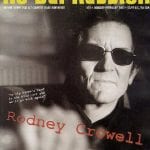Blue Mountain – It’s not all over now, baby blue
“Our A&R guy was fired,” says Laurie. “We knew we could be in trouble then and we asked them to let us out. The owner of the label really was a fan of the band, he was very into the band, and he wanted another shot at trying to break the band.
“But, at that point a lot of the staff had changed so much that the people we originally started working with, who were really into the band, were gone. But it worked out well, because we finally called them and asked, after this last record, Tales Of A Traveler [1999], and they let us go. We asked, I guess, about three times.
“You know, that label has a lot going for it in a lot of ways. They have a lot of money, they really know how to work the metal thing. I don’t think they really knew what to do with us. That was the main thing. They were good people, but it was just not the right situation.”
Their last album has sold a little less than 10,000 copies.
“It’s paying your dues,” Laurie says. “And you always think, well, maybe now I’ve paid my dues. But you never have.”
It is possible to buy cold beer only in the bars of Oxford, Mississippi, and not at all on Sunday. (Students at Ole Miss sell a T-shirt that boasts, “We Might Not Win The Game, But We Never Lost A Party.”) On Sunday it is necessary to drive out of town, over a bridge, and turn left just across the county line, down an unmarked dirt road. Most of the pickup trucks in the lot seem to have gone fishing, and run dry. There is little food in the store (potato chips aren’t really food, are they?), though the barbecue doesn’t smell half bad. A very large man sits on a stool at the door taking money.
Laurie smiles. “We know exactly where that store is.”
“If you take that road another ten miles, take a left on Highway 4, about six miles,” Cary adds, “that’s the locus of where R.L. Burnside, Junior Kimbrough and all that stuff comes from.”
And if you take other paths from Oxford, there are other, more storied crossroads to visit in the Mississippi dusk. Burnside and the late Kimbrough are at the tail end of something, probably the final generation for whom the blues is not an acquired, adopted vocabulary. And if they couldn’t have lasted in a 1930s cutting party with Robert Johnson’s friends, there is still much to be said for meaning it, man.
And paying dues. “They used to play in little bars and stuff, but nobody really paid much attention,” Cary says. “I was really fortunate, I got to see Junior Kimbrough play a whole bunch of times. We knew each other, but not on a personal level. But then I went out with R.L. Burnside to fill in for their guitar player on three different short tours, so I actually kinda got to know them, a real treat.”
Oxford is a nourishing, drinking, thinking kind of place, where native son William Faulkner is posthumously toasted, where John Grisham, Larry Brown, Barry Hannah and a host of lesser-known writers make their home. It boasts Square Books, one of the best independent book stores in the United States, a pretty fair independent record store called Uncle Buck’s, the Fat Possum label, Oxford American magazine, Ole Miss, and Blue Mountain.
It is a small town, centered around a square where people stroll and chat. And it is old, strikingly old compared to anything on the West Coast. Oxford is the center of a very poor state, replete with the decay of plantation culture, the memory of Civil Rights fury, and a trace of the smart swagger of the new South. In short, Oxford is that rare place where — to an outsider, at least — it still seems to mean something to be Southern.
That’s what Blue Mountains records have been about. Not necessarily the politics (notwithstanding “Jimmy Carter”), but the thinking, the drinking, and the still-distinct quality of being Southern. It runs throughout Hudson’s versatile guitar work, currents of blues, Southern rock, punk, pop, and slow days on the back porch watching dogs dream.




